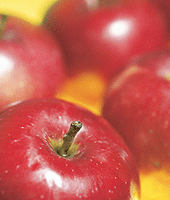Advertisement
Eating Organic
Eating organic is the surest way to avoid synthetic pesticides and genetically engineered foods, so shifting the diet to emphasize certified organic foods is important for all of us. However, certain foods tend to have higher pesticide residues than others, and there are some so heavily contaminated that they are best avoided if not available … Continued
 Eating organic is the surest way to avoid synthetic pesticides and genetically engineered foods, so shifting the diet to emphasize certified organic foods is important for all of us.
Eating organic is the surest way to avoid synthetic pesticides and genetically engineered foods, so shifting the diet to emphasize certified organic foods is important for all of us.
However, certain foods tend to have higher pesticide residues than others, and there are some so heavily contaminated that they are best avoided if not available organically grown. It may be surprising to find that this list includes some of our favourite fruits and vegetables.
Apples
The Alar scare in the 1980s alerted us to the fact that even the apple, always considered wholesome and healthy, is commonly treated with toxic chemicals. In fact, United States Food and Drug Administration tests have detected 36 different pesticide residues on apples, including the fungicide captan (a carcinogen) and the insecticide chlorphyrifos (a neurotoxin). A portion of these pesticides penetrates even the flesh of the fruit and therefore can’t be washed off. Non-organic apples are also heavily wax-coated to prolong shelf life. This wax, too, is not removed by washing.
Bananas
Pesticides used on banana plantations include chlorphyrifos and the chemical benomyl, which has been linked to birth defects. In Costa Rica, a major exporter of bananas, 35 percent of the country’s pesticide imports are applied to bananas. As if pesticides were not enough, bananas are also artificially ripened with ethylene gas.
Grains
Who would think that wholesome staple foods such as grains, including rice and oats, have some of the highest levels of pesticide residues? Rice is contaminated both by the pesticides that are applied to the crops themselves and by water-soluble insecticides and fungicides that have seeped into the groundwater near rice fields. Both imported and domestic types of rice are affected. Oats and other popular grains are subject to similar contamination.
Green Beans
Neurotoxins and endocrine-disruptor chemicals are among the chemicals applied in the process of growing green beans. In total, there are 60 different pesticides registered with the US Environmental Protection Agency for use on green beans. Of particular concern are green beans imported from Mexico; many of these crops are contaminated with illegal pesticides.
Peaches
Like the apple, this popular fruit is subject to repeated pesticide applications. According to a report by the Environmental Working Group (EWG; ewg.org), a non-profit environmental organization based in Washington, DC, peaches, apples and nectarines are the most common source of exposure for young children to unsafe levels of organophosphate pesticides. The next time you give your little one a juicy peach, make sure it is organic!
Strawberries
Everyone knows that strawberries are a seasonal fruit, yet they are now available almost year-round. But we pay a high price for this luxury. An EWG study considers strawberries the single most heavily contaminated fruit or vegetable. Strawberries are also the target of genetic engineering. For instance, some of the genes of strawberries that are available out of season may have been spliced with cold-water fish genes in an attempt to make the strawberries more resistant to frost.
Meat and Dairy
Whenever we eat higher on the food chain, as we do with meat or dairy, we ingest the concentrated residues of any chemicals that were consumed by the animal whose meat or milk we are consuming. Meat and milk from animals raised with intensive farming practices can be laced not only with pesticides from the animals’ feed, but also with antibiotics and hormones. Crammed, unnatural conditions often make the animals ill, requiring the administration of medication, including antibiotics.
Milk imported from the US is almost certain to contain recombinant bovine growth hormone (rBGH), a genetically engineered hormone used to boost milk production. A large percentage of cows treated with rBGH are vulnerable to developing clinical mastitis, an infection of the udder, which then necessitates the administration of massive doses of antibiotics.
Organic Alternatives
All of the items listed above are not only popular foods that most people consume, but they are also commonly among the first foods that baby eats, whether pur? at home or store-bought. As a responsible parent, would you knowingly give your baby food quite possibly laced with toxic chemicals and pharmaceuticals? Fortunately, organic alternatives are readily available in health food stores, as well as in many supermarkets.
If you have difficulty finding a store that carries organic foods, search the Internet for organic delivery services. liferesearchuniversal.com/caorganics.html has a listing of those in Ontario, BC and Quebec. Consult the Web site of the Canadian Organic Growers (cog.ca) and search their directory for organic producers and retailers in your area. Another helpful source of information is the Organic Trade Association (ota.com).
Higher Price Tag?
Why do organic foods generally have higher price tags? Is it fair that we are paying a premium for natural foods? Perhaps we need to turn these questions around: Is it fair that farmers using intensive chemical agricultural practices enjoy tax breaks and indirect subsidies, such as public and private research dollars, for growing foods dowsed with toxic pesticides? Considering the “hidden” costs to personal health and the environment, such as soil, air and water contamination, loss of biodiversity, soil erosion, and the resulting medical expenses, are non-organic foods really less expensive?
Organic farms typically operate on a small scale, which means that farming is considerably more labour intensive. Organic farmers and processors must also pay for the cost of organic certification, which requires documentation of all the steps involved in organic production from soil management and seed purchase to harvesting, handling and shipping. None of these costs are subsidized by chemical and pharmaceutical manufacturing giants, so they must be added to the final price of the product.
When we consider the impact of agricultural chemicals on our health, the health of our planet and the health of our children and future generations, it becomes clear that none of us can afford not to buy organic!




